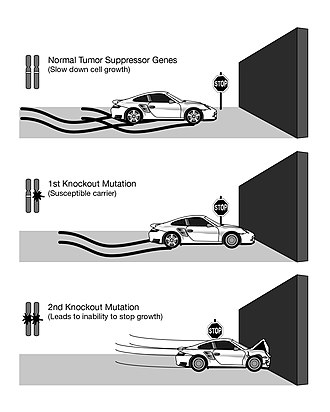Tumor suppressor gene
Genes that protect a cell from one step on the path to cancer
Tumor suppressor genes are a class of genes that play a critical role in regulating the cell cycle, repairing DNA, and ensuring the stability of a cell's genome. When these genes are mutated or inactivated, cells can grow uncontrollably, leading to the development of cancer.
Function[edit]
Tumor suppressor genes are essential for maintaining normal cellular functions. They can be categorized into several types based on their roles:
- Gatekeepers: These genes directly regulate cell growth by controlling the cell cycle and promoting apoptosis (programmed cell death). Examples include the retinoblastoma protein (pRB) and p53.
- Caretakers: These genes are involved in maintaining genomic integrity by repairing DNA damage. Mutations in caretaker genes can lead to increased mutation rates in other genes, including gatekeepers. Examples include BRCA1 and BRCA2.
- Landscapers: These genes influence the surrounding cellular environment, which can affect tumor development. They are less well-defined compared to gatekeepers and caretakers.
Mechanism[edit]
Tumor suppressor genes typically require both alleles to be inactivated for a loss of function, a concept known as the "two-hit hypothesis" proposed by Alfred Knudson. This hypothesis suggests that both copies of a tumor suppressor gene must be mutated for cancer to develop.

Examples[edit]
- p53: Often referred to as the "guardian of the genome," p53 is a transcription factor that regulates the cell cycle and induces apoptosis in response to DNA damage.
- RB1: The retinoblastoma protein is crucial for controlling the cell cycle by inhibiting the transition from the G1 phase to the S phase.
- APC: The adenomatous polyposis coli protein is involved in the Wnt signaling pathway and helps regulate cell growth and adhesion.
Role in Cancer[edit]
Mutations in tumor suppressor genes are a common feature in many types of cancer. For instance, mutations in the p53 gene are found in approximately 50% of all human cancers. The loss of function in these genes removes critical checks on cell division and DNA repair, allowing for the accumulation of additional mutations that drive cancer progression.

Models of Tumor Suppression[edit]
Several models have been proposed to explain how tumor suppressor genes function to prevent cancer:
- Oncogene-induced senescence: Tumor suppressor genes can induce a permanent state of cell cycle arrest in response to oncogenic signals.
- Apoptosis induction: In response to severe DNA damage, tumor suppressor genes can trigger apoptosis to eliminate potentially cancerous cells.

Related pages[edit]
References[edit]
<references group="" responsive="1"></references>
-
Diagram of the cell cycle
-
Models of tumour suppression
-
Two-hit hypothesis illustration
Ad. Transform your life with W8MD's Budget GLP-1 injections from $49.99


W8MD offers a medical weight loss program to lose weight in Philadelphia. Our physician-supervised medical weight loss provides:
- Weight loss injections in NYC (generic and brand names):
- Zepbound / Mounjaro, Wegovy / Ozempic, Saxenda
- Most insurances accepted or discounted self-pay rates. We will obtain insurance prior authorizations if needed.
- Generic GLP1 weight loss injections from $49.99 for the starting dose of Semaglutide and $65.00 for Tirzepatide.
- Also offer prescription weight loss medications including Phentermine, Qsymia, Diethylpropion, Contrave etc.
NYC weight loss doctor appointmentsNYC weight loss doctor appointments
Start your NYC weight loss journey today at our NYC medical weight loss and Philadelphia medical weight loss clinics.
- Call 718-946-5500 to lose weight in NYC or for medical weight loss in Philadelphia 215-676-2334.
- Tags:NYC medical weight loss, Philadelphia lose weight Zepbound NYC, Budget GLP1 weight loss injections, Wegovy Philadelphia, Wegovy NYC, Philadelphia medical weight loss, Brookly weight loss and Wegovy NYC
|
WikiMD's Wellness Encyclopedia |
| Let Food Be Thy Medicine Medicine Thy Food - Hippocrates |
Medical Disclaimer: WikiMD is not a substitute for professional medical advice. The information on WikiMD is provided as an information resource only, may be incorrect, outdated or misleading, and is not to be used or relied on for any diagnostic or treatment purposes. Please consult your health care provider before making any healthcare decisions or for guidance about a specific medical condition. WikiMD expressly disclaims responsibility, and shall have no liability, for any damages, loss, injury, or liability whatsoever suffered as a result of your reliance on the information contained in this site. By visiting this site you agree to the foregoing terms and conditions, which may from time to time be changed or supplemented by WikiMD. If you do not agree to the foregoing terms and conditions, you should not enter or use this site. See full disclaimer.
Credits:Most images are courtesy of Wikimedia commons, and templates, categories Wikipedia, licensed under CC BY SA or similar.
Translate this page: - East Asian
中文,
日本,
한국어,
South Asian
हिन्दी,
தமிழ்,
తెలుగు,
Urdu,
ಕನ್ನಡ,
Southeast Asian
Indonesian,
Vietnamese,
Thai,
မြန်မာဘာသာ,
বাংলা
European
español,
Deutsch,
français,
Greek,
português do Brasil,
polski,
română,
русский,
Nederlands,
norsk,
svenska,
suomi,
Italian
Middle Eastern & African
عربى,
Turkish,
Persian,
Hebrew,
Afrikaans,
isiZulu,
Kiswahili,
Other
Bulgarian,
Hungarian,
Czech,
Swedish,
മലയാളം,
मराठी,
ਪੰਜਾਬੀ,
ગુજરાતી,
Portuguese,
Ukrainian


